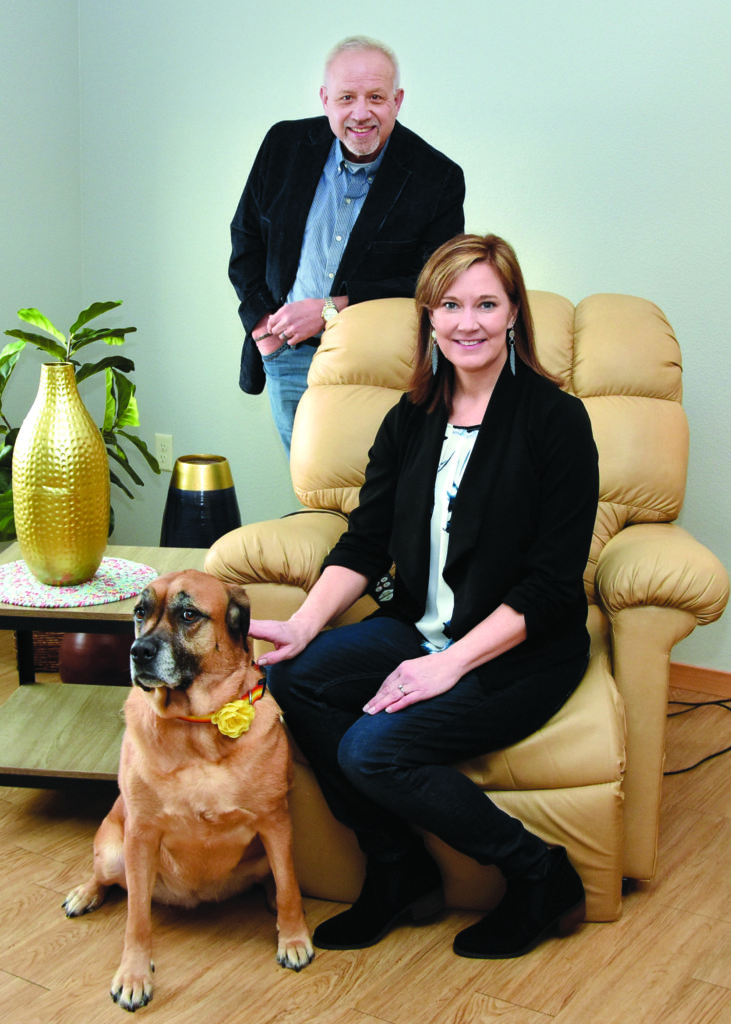
Nancy Edmonds Hanson
Many – perhaps most – people don’t want to spend the last days and hours of their lives in a hospital room. “When it’s been determined that you’re not going to get better, typically, you want to be at home,” says Roger Erickson. “But that’s not always possible.”
That’s why Farmstead Care in south Moorhead, an assisted living and memory care facility, has converted two of its suites for a new type of resident – men and women who are under hospice care. The large, furnished suites have the amenities of its regular assisted living accommodations, including comfortable sitting areas, a sunny spot where hospice caregivers can bring a hospital bed, and a bedroom for family caregivers.
Hospice care focuses on a person’s last six months of life of less. When curative treatment is no longer an option, hospice professionals work to make the patient’s life as comfortable as possible. Three Fargo-Moorhead organizations offer this kind of assistance: Hospice of the Red River Valley, Ethos and CHI Health at Home. They aim to: make the patient comfortable, ease pain and other symptoms, and support the family through a sad and difficult time.
“There are a lot of reasons why it’s not realistic for some people to spend their last days at home,” Roger points out. “They may not have family who are able to be with them. They may have additional care needs that are hard to accommodate there. But at the same time, they and their caregivers want the peace, quiet and privacy that a hospital room just can’t provide.”
“When we started Farmstead in 2006, we started to get calls to see if we could help a couple years ago,” he says. His Farmstead Living complex in southeast Moorhead, which includes independent living apartments for older adults, already had introduced a large facility offering assisted living, advanced care and memory care. Accommodating end-of-life patients seemed a logical next step.
“What people don’t understand about hospice is that it’s not a 24-hour service,” Roger explains. “That’s where we come in. We have 24-hour nursing care by LPNs and CNAs and a director of nursing who’s a registered nurse. We provide care, including medication administration, monitoring, lifts and incontinence care around the clock, and our staff is in pretty much constant contact with the hospice services. The hospice RNs and medical director are in charge of all patient care and provide access to end-of-life drugs to assure their comfort. Our Farmstead staff carry out their directions.”
Other Farmstead apartments are unfurnished, to be personalized by new residents with their own furnishings and decor. Hospice suites, on the other hand, are ready to go, with plenty of comfortable seating, cable television, a bed in the guest room and casual, homey touches. Caregivers can join residents for meals in the spacious atrium or have meals in their own suite.
Ten years ago when Roger built Farmstead Estates – the independent living apartment complex just across 28th Street – his goal was to provide homes where older adults could spend the rest of their lives. That led to Farmstead Villa, another independent living facility where enhanced services like meals and cleaning services are optional for those who’d like more convenience, and Farmstead Care itself.
“When I started this, I didn’t see the growing need for long-term care and eventually hospice,” he says. “We’ve always thought it was important for people to move in and make this their home throughout the remainder of the aging process. Adding those options came naturally. It just makes sense.”
When those who are already Farmstead residents enter hospice care, he notes, they are cared for in their own apartment homes among the friends and neighbors, as well as staff, who have become their long-term community. Those who come specifically for end-of-life care stay for far shorter periods. Because of the qualification for hospice – the likelihood of six months or less to live – their stays have typically extended from several months to, in one case, just 14 hours.
Roger observes. “As people live longer, there’s more need for all types of aging facilities, along with hospice, home health and other services. We want this to be their home … for as long as they want and need it.”
For more information on all of Farmstead’s facilities, including hospice suites, call Roger or executive director Lisa Martin, (218) 512-2020, or visit www.farmsteadcare.com.

